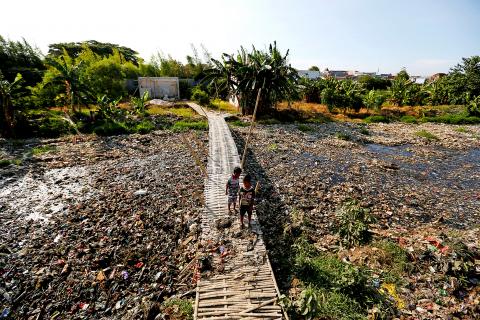Boys played and chatted on a rickety wooden bridge under a baking sun in West Java, while just below their feet flowed one of Indonesia’s most horribly polluted rivers, clogged with hundreds of tonnes of smelly trash.
Authorities in the nation of 260 million are battling a lack of recycling culture or environmental awareness to achieve an ambitious target of a 70 percent cut in marine plastic debris by 2025, despite having devoted US$1 billion a year to the task.
“Every time it rains and floods, the whole village goes down to help with the trash and clean the river,” said Marzuki, a resident of Tarumajaya, on the banks of the Pisang Batu River that carries along waste from villages upstream. “We never get tired of it, but the trash never stops coming.”

Photo: Reuters
The river is just one of many thickly carpeted with trash formed mostly of plastic waste, of which Indonesia churns out about 3.2 million tonnes each year, with nearly half ending up in the sea, a 2015 study in the journal Science showed.
The archipelago of more than 17,000 islands is estimated to be the world’s second-largest contributor of plastic pollutants in the oceans after China, the study added.
“Even though we’ve brought an armada of 25 garbage trucks that take three turns every day, the reality is ... we haven’t cleared even half of it,” Tarumajaya security chief Suseno said.
As Java struggles with its rivers, the resort island of Bali this year banned the use of plastic bags by large supermarkets and grocery stores, a measure it aims to widen to smaller shops.
The ban caused a backlash.
“I’ve seen people protest because they didn’t get plastic bags after they shop,” supermarket shopper Thomas Wibowo said, adding that he understood the need to cut back. “But if we are suddenly forbidden from using plastic, as Indonesians, we’d be shocked.”
The risks to marine life were graphically highlighted in November last year, when a dead sperm whale on a beach was found to have 6kg of plastic waste in its stomach.
“I think this is also a global issue, not just a national problem,” said Ida Bagus Rai Dharmawijaya Mantra, the mayor of Bali’s capital, Denpasar. “I’ve seen that a lot of citizens are accepting and helping of this movement, including tourists. They too want to help replace plastic bags.”

IDENTITY: A sex extortion scandal involving Thai monks has deeply shaken public trust in the clergy, with 11 monks implicated in financial misconduct Reverence for the saffron-robed Buddhist monkhood is deeply woven into Thai society, but a sex extortion scandal has besmirched the clergy and left the devout questioning their faith. Thai police this week arrested a woman accused of bedding at least 11 monks in breach of their vows of celibacy, before blackmailing them with thousands of secretly taken photos of their trysts. The monks are said to have paid nearly US$12 million, funneled out of their monasteries, funded by donations from laypeople hoping to increase their merit and prospects for reincarnation. The scandal provoked outrage over hypocrisy in the monkhood, concern that their status

The United States Federal Communications Commission said on Wednesday it plans to adopt rules to bar companies from connecting undersea submarine communication cables to the US that include Chinese technology or equipment. “We have seen submarine cable infrastructure threatened in recent years by foreign adversaries, like China,” FCC Chair Brendan Carr said in a statement. “We are therefore taking action here to guard our submarine cables against foreign adversary ownership, and access as well as cyber and physical threats.” The United States has for years expressed concerns about China’s role in handling network traffic and the potential for espionage. The U.S. has

A disillusioned Japanese electorate feeling the economic pinch goes to the polls today, as a right-wing party promoting a “Japanese first” agenda gains popularity, with fears over foreigners becoming a major election issue. Birthed on YouTube during the COVID-19 pandemic, spreading conspiracy theories about vaccinations and a cabal of global elites, the Sanseito Party has widened its appeal ahead of today’s upper house vote — railing against immigration and dragging rhetoric that was once confined to Japan’s political fringes into the mainstream. Polls show the party might only secure 10 to 15 of the 125 seats up for grabs, but it is

The US Department of Education on Tuesday said it opened a foreign funding investigation into the University of Michigan (UM) while alleging it found “inaccurate and incomplete disclosures” in a review of the university’s foreign reports, after two Chinese scientists linked to the school were separately charged with smuggling biological materials into the US. As part of the investigation, the department asked the university to share, within 30 days, tax records related to foreign funding, a list of foreign gifts, grants and contracts with any foreign source, and other documents, the department said in a statement and in a letter to